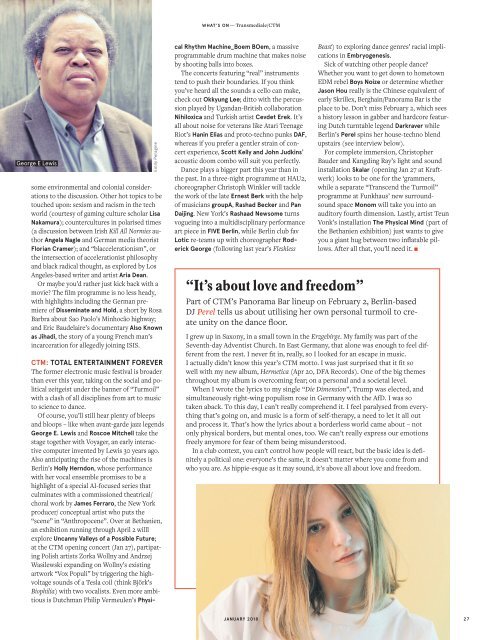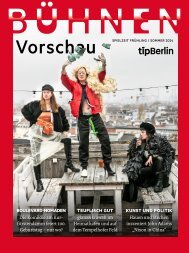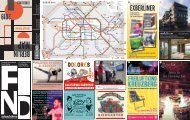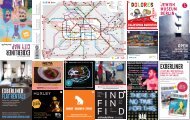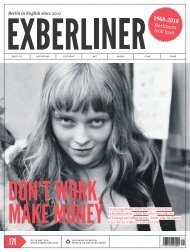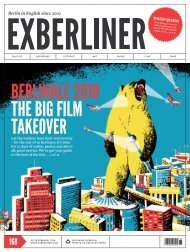Exberliner Issue 167, January 2018
Create successful ePaper yourself
Turn your PDF publications into a flip-book with our unique Google optimized e-Paper software.
WHAT’S ON — Transmediale/CTM<br />
George E Lewis<br />
some environmental and colonial considerations<br />
to the discussion. Other hot topics to be<br />
touched upon: sexism and racism in the tech<br />
world (courtesy of gaming culture scholar Lisa<br />
Nakamura); countercultures in polarised times<br />
(a discussion between Irish Kill All Normies author<br />
Angela Nagle and German media theorist<br />
Florian Cramer); and “blaccelerationism”, or<br />
the intersection of accelerationist philosophy<br />
and black radical thought, as explored by Los<br />
Angeles-based writer and artist Aria Dean.<br />
Or maybe you’d rather just kick back with a<br />
movie? The film programme is no less heady,<br />
with highlights including the German premiere<br />
of Disseminate and Hold, a short by Rosa<br />
Barbra about Sao Paolo’s Minhocão highway;<br />
and Eric Baudelaire’s documentary Also Known<br />
as Jihadi, the story of a young French man’s<br />
incarceration for allegedly joining ISIS.<br />
Emily Peragine<br />
CTM: TOTAL ENTERTAINMENT FOREVER<br />
The former electronic music festival is broader<br />
than ever this year, taking on the social and political<br />
zeitgeist under the banner of “Turmoil”<br />
with a clash of all disciplines from art to music<br />
to science to dance.<br />
Of course, you’ll still hear plenty of bleeps<br />
and bloops – like when avant-garde jazz legends<br />
George E. Lewis and Roscoe Mitchell take the<br />
stage together with Voyager, an early interactive<br />
computer invented by Lewis 30 years ago.<br />
Also anticipating the rise of the machines is<br />
Berlin’s Holly Herndon, whose performance<br />
with her vocal ensemble promises to be a<br />
highlight of a special AI-focused series that<br />
culminates with a commissioned theatrical/<br />
choral work by James Ferraro, the New York<br />
producer/ conceptual artist who puts the<br />
“scene” in “Anthropocene”. Over at Bethanien,<br />
an exhibition running through April 2 willl<br />
explore Uncanny Valleys of a Possible Future;<br />
at the CTM opening concert (Jan 27), partipating<br />
Polish artists Zorka Wollny and Andrzej<br />
Wasilewski expanding on Wollny’s existing<br />
artwork “Vox Populi” by triggering the highvoltage<br />
sounds of a Tesla coil (think Björk’s<br />
Biophilia) with two vocalists. Even more ambitious<br />
is Dutchman Philip Vermeulen’s Physical<br />
Rhythm Machine_Boem BOem, a massive<br />
programmable drum machine that makes noise<br />
by shooting balls into boxes.<br />
The concerts featuring “real” instruments<br />
tend to push their boundaries. If you think<br />
you’ve heard all the sounds a cello can make,<br />
check out Okkyung Lee; ditto with the percussion<br />
played by Ugandan-British collaboration<br />
Nihiloxica and Turkish artist Cevdet Erek. It’s<br />
all about noise for veterans like Atari Teenage<br />
Riot’s Hanin Elias and proto-techno punks DAF,<br />
whereas if you prefer a gentler strain of concert<br />
experience, Scott Kelly and John Judkins’<br />
acoustic doom combo will suit you perfectly.<br />
Dance plays a bigger part this year than in<br />
the past. In a three-night programme at HAU2,<br />
choreographer Christoph Winkler will tackle<br />
the work of the late Ernest Berk with the help<br />
of musicians groupA, Rashad Becker and Pan<br />
Daijing. New York’s Rashaad Newsome turns<br />
vogueing into a multidisciplinary performance<br />
art piece in FIVE Berlin, while Berlin club fav<br />
Lotic re-teams up with choreographer Roderick<br />
George (following last year’s Fleshless<br />
Beast) to exploring dance genres’ racial implications<br />
in Embryogenesis.<br />
Sick of watching other people dance?<br />
Whether you want to get down to hometown<br />
EDM rebel Boys Noize or determine whether<br />
Jason Hou really is the Chinese equivalent of<br />
early Skrillex, Berghain/Panorama Bar is the<br />
place to be. Don’t miss February 2, which sees<br />
a history lesson in gabber and hardcore featuring<br />
Dutch turntable legend Darkraver while<br />
Berlin’s Perel spins her house-techno blend<br />
upstairs (see interview below).<br />
For complete immersion, Christopher<br />
Bauder and Kangding Ray’s light and sound<br />
installation Skalar (opening Jan 27 at Kraftwerk)<br />
looks to be one for the ‘grammers,<br />
while a separate “Transcend the Turmoil”<br />
programme at Funkhaus’ new surroundsound<br />
space Monom will take you into an<br />
auditory fourth dimension. Lastly, artist Teun<br />
Vonk’s installation The Physical Mind (part of<br />
the Bethanien exhibition) just wants to give<br />
you a giant hug between two inflatable pillows.<br />
After all that, you’ll need it. n<br />
“It’s about love and freedom”<br />
Part of CTM’s Panorama Bar lineup on February 2, Berlin-based<br />
DJ Perel tells us about utilising her own personal turmoil to create<br />
unity on the dance floor.<br />
I grew up in Saxony, in a small town in the Erzgebirge. My family was part of the<br />
Seventh-day Adventist Church. In East Germany, that alone was enough to feel different<br />
from the rest. I never fit in, really, so I looked for an escape in music.<br />
I actually didn’t know this year’s CTM motto. I was just surprised that it fit so<br />
well with my new album, Hermetica (Apr 20, DFA Records). One of the big themes<br />
throughout my album is overcoming fear; on a personal and a societal level.<br />
When I wrote the lyrics to my single “Die Dimension”, Trump was elected, and<br />
simultaneously right-wing populism rose in Germany with the AfD. I was so<br />
taken aback. To this day, I can’t really comprehend it. I feel paralysed from everything<br />
that’s going on, and music is a form of self-therapy, a need to let it all out<br />
and process it. That’s how the lyrics about a borderless world came about – not<br />
only physical borders, but mental ones, too. We can’t really express our emotions<br />
freely anymore for fear of them being misunderstood.<br />
In a club context, you can’t control how people will react, but the basic idea is definitely<br />
a political one: everyone’s the same, it doesn’t matter where you come from and<br />
who you are. As hippie-esque as it may sound, it’s above all about love and freedom.<br />
JANUARY <strong>2018</strong><br />
27


